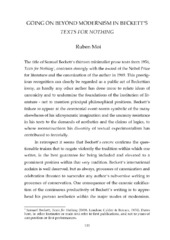| dc.contributor.author | Moi, Ruben | |
| dc.date.accessioned | 2016-04-15T12:15:03Z | |
| dc.date.available | 2016-04-15T12:15:03Z | |
| dc.date.issued | 2005 | |
| dc.Published | Nordlit 2005(18):133-153 | eng |
| dc.identifier.issn | 1503-2086 | |
| dc.identifier.uri | https://hdl.handle.net/1956/11918 | |
| dc.description.abstract | The title of Samuel Beckett's thirteen minimalist prose texts from 1954, Texts for Nothing, contrasts strongly with the award of the Nobel Prize for literature and the canonization of the author in 1969. This prestigious recognition can clearly be regarded as a public act of Beckettian irony, as hardly any other author has done more to refute ideas of canonicity and to undermine the foundations of the institution of literature - not to mention principal philosophical positions. Beckett's failure to appear at the ceremonial event seems symbolic of the many elsewheres of his idiosyncratic imagination and the uncanny resistance in his texts to the demands of aesthetics and the claims of logics, to whose reconstructions his diversity of textual experimentalism has contributed so forcefully. | en_US |
| dc.language.iso | eng | eng |
| dc.publisher | Institutt for kultur, litteratur og språkvitenskap ved Fakultet for humaniora, samfunnsvitenskap og lærerutdanning, UiT Norges arktiske universitet | eng |
| dc.rights | Attribution CC BY 3.0 | eng |
| dc.rights.uri | http://creativecommons.org/licenses/by/3.0/ | eng |
| dc.subject | Samuel Beckett | eng |
| dc.subject | Texts for Nothing | eng |
| dc.title | Going on beyond Modernism in Beckett's Texts for Nothing | eng |
| dc.type | Peer reviewed | |
| dc.type | Journal article | |
| dc.date.updated | 2016-04-07T10:15:23Z | |
| dc.description.version | publishedVersion | |
| dc.rights.holder | Copyright 2005 Ruben Moi | eng |
| dc.identifier.doi | https://doi.org/10.7557/13.1855 | |
| dc.subject.nsi | VDP::Humaniora: 000 | |

